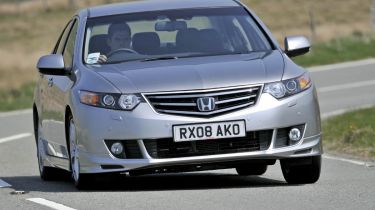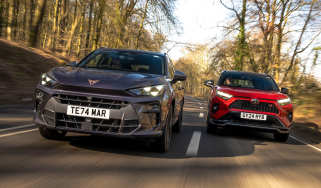Honda Accord 2.2 i-DTEC
Improved saloon has its sights set on family car class honours.
Classy, but not from the class above. That’s the best way to sum up the outgoing Honda Accord, launched in the UK in 2003. Take a look at the new version and you could be forgiven for thinking nothing has changed – but the model driven here is fresh from the ground up.
Emulating the evolutionary styling approach taken by Mercedes and BMW, Honda accepts it hasn’t been all that daring. Study the new Accord, however, and you’ll notice that while the angular lines of the old model remain, the overall stance and proportions are much more athletic.
Video: watch CarBuyer's video review of the Honda Accord
[[{"type":"media","view_mode":"content_narrow","fid":"68307","attributes":{"alt":"","class":"media-image"}}]]
The new version is 80mm wider and the wheelbase 35mm longer than its forebear’s, adding to the muscular appearance. Yet in this company, only the 4,695mm Laguna is shorter. Aerodynamics have been a priority, and the EX GT has a sporty bodykit – the front is so deep, it’s vulnerable to catching on large speed bumps.
Despite the new, lower roofline, the interior doesn’t feel cramped because the floor has been dropped by 10mm. And the cabin is actually a big step forward, with a first-class design and great, shoulder-supporting seats.
Many find the Civic’s busy dashboard daunting, so the more conservative approach in the Accord strikes a better balance. Instead of a comprehensive BMW iDrive-style control system, there’s a huge array of switchgear, but it’s all clearly labelled and logically organised.
Quality is excellent, while the attention to detail is a revelation. The dash has floating dials similar to those in Mercedes cars, and there’s a prominent indicator to advise the driver of the optimum point to change gear – irritating at first, but useful for maximising economy.
While headroom in the back seats is generous, there’s substantially less leg and footroom than in any competitor here. The rear squab is sculpted for only two passengers, so sitting in the middle isn’t comfortable for adults.
At 460 litres, the boot is miserly. It’s bigger than the Citroen’s 439 litres, but dwarfed by the Ford’s 540-litre capacity, and has an odd shape. It’s unlike Honda to leave some bare metal in the load area – the speakers and DVD player are exposed.
While practicality has been compromised, the driving dynamics are superb. The front-wheel-drive Honda has a lively set-up and was the most entertaining and agile car here on twisty A and B-roads. It’s not as self-assured as the Mondeo, moving around more as grip transfers between the rear and front wheels, but the accurate steering makes it great fun.
In more relaxed circumstances, however, the new suspension disappoints. On seemingly smooth motorways, it fails to settle and doesn’t iron out minor undulations as easily as the Ford.
Contrasting the vast array of Mondeo engine options, the Accord comes with three: two petrol and one diesel. The heavily revised oil-burner will be the big seller. As well as a new name – i-DTEC – it gains a power hike of 10bhp to 148bhp.
The frugal unit is mated to one of the slickest six-speed manuals around, and is smooth and flexible. In-gear pace is punchy, if not thrilling.
Prices start at £19,260, so the Honda is up to £2,000 more expensive than its predecessor. The well equipped EX GT comes close to £25,000, making the Accord the costliest here – and it’s lost some practicality. Will its sharp design and well honed set-up be enough to see it through?
Details
Price: £24,910
Model tested: Accord 2.2 i-DTEC EX GT
Chart position: 2
WHY: New, upmarket Accord is on sale now in saloon form. A Tourer joins the line-up in September.
Economy
A claimed 50.4mpg is joint best on test. In our hands over a mixed route, the Honda averaged an impressive 43.9mpg.
Residuals
The new Accord is set to do better than the outgoing car, retaining 41 per cent of its value in this trim. The estate will depreciate less.
Tax
New i-DTEC will be favoured by user-chooser company car drivers, as even a higher-rate earner will fork out less than £2,000 a year in tax.







